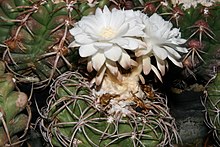Discocactus bahiensis
| Discocactus bahiensis | |
|---|---|

| |
| Scientific classification | |
| Kingdom: | Plantae |
| Clade: | Tracheophytes |
| Clade: | Angiosperms |
| Clade: | Eudicots |
| Order: | Caryophyllales |
| Family: | Cactaceae |
| Subfamily: | Cactoideae |
| Genus: | Discocactus |
| Species: | D. bahiensis
|
| Binomial name | |
| Discocactus bahiensis Britton & Rose 1922
| |
| Synonyms | |
| |
Discocactus bahiensis is a species of Discocactus from Brazil.[3]
Description
[edit]Discocactus bahiensis grows solitary, with heavily spined, depressed spherical to spherical bodies that reach diameters of 8 to 18 centimeters. There are 10 to 15 ribs. The areoles are wooly have 5 to 13 backward-curved spines are up to 3 centimeters long. The prominent cephalium is formed of white wool and a few short bristles. The slender, funnel-shaped, yellowish white flowers are 4 to 5 centimeters long. The fruits are small and red.[4]
Subspecies
[edit]- Discocactus bahiensis subsp. bahiensis
- Discocactus bahiensis subsp. gracilis P.J.Braun & Esteves
Distribution
[edit]Discocactus bahiensis is a cactus species native to the Brazilian state of Bahia at altitudes between 380 and 650 meters. Plants are found growing in limestone near rivers and flood plains.[5]
Taxonomy
[edit]It was first described in 1922 by Nathaniel Lord Britton and Joseph Nelson Rose. The species name "bahiensis" specifically denotes its presence in Bahia, Brazil.
References
[edit]- ^ Kew), Nigel Taylor (RBG; Assessment), Pierre Braun (Global Cactus (2010-06-04). "The IUCN Red List of Threatened Species". IUCN Red List of Threatened Species. Retrieved 2024-01-22.
- ^ "Appendices | CITES". cites.org. Retrieved 2022-01-14.
- ^ "Discocactus bahiensis in Tropicos".
- ^ Anderson, Edward F.; Eggli, Urs (2005). Das grosse Kakteen-Lexikon (in German). Stuttgart (Hohenheim): Ulmer. ISBN 3-8001-4573-1.
- ^ "Discocactus bahiensis". LLIFLE. 2013-08-04. Retrieved 2024-01-22.
External links
[edit] Media related to Discocactus bahiensis at Wikimedia Commons
Media related to Discocactus bahiensis at Wikimedia Commons Data related to Discocactus bahiensis at Wikispecies
Data related to Discocactus bahiensis at Wikispecies

